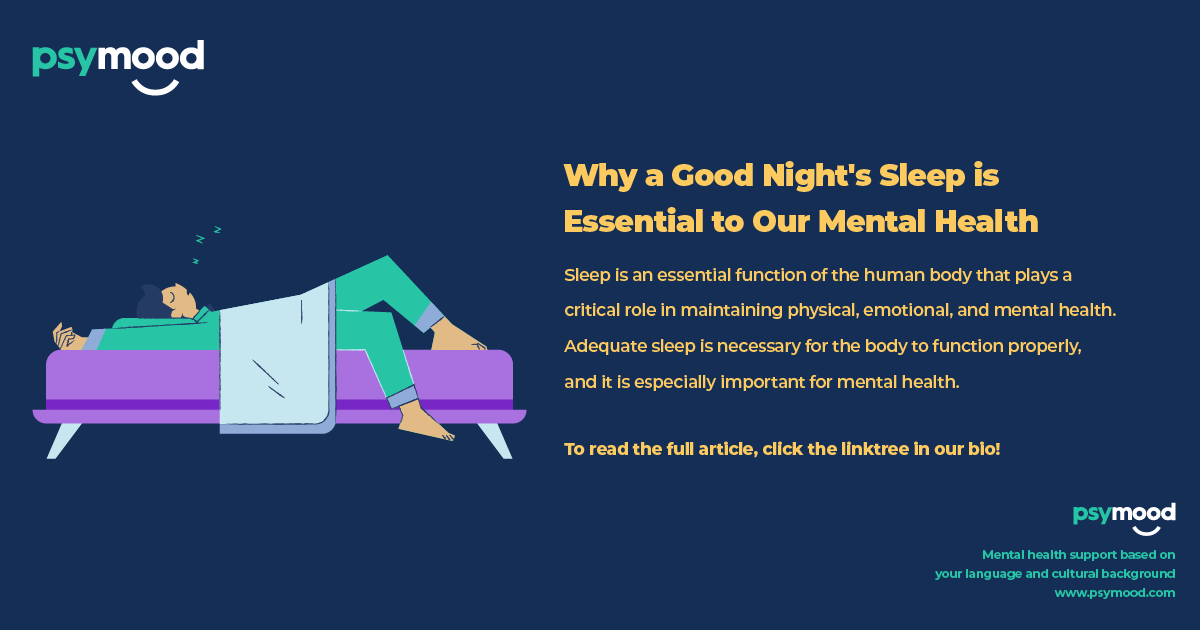Why a Good Night's Sleep is Essential to Our Mental Health
Sleep is an essential function of the human body that plays a critical role in maintaining physical, emotional, and mental health. Adequate sleep is necessary for the body to function properly, and it is especially important for mental health. In this blog, we will explore the importance of sleep on mental health and how a lack of sleep can negatively impact mental health.
Sleep and Mental Health
Getting a good night’s sleep is critical for optimal mental health. Sleep plays a vital role in regulating mood, emotions, and cognitive processes. Sleep also plays a critical role in memory strengthening and learning. A lack of sleep can cause cognitive impairment, mood disturbances, and can even lead to more severe mental health problems such as depression and anxiety.
Sleep and Anxiety
Anxiety disorders are one of the most common mental health problems in the world, affecting millions of people each year. Anxiety can cause many physical symptoms, including racing thoughts, heart palpitations, and difficulty breathing. Anxiety can also make it difficult to sleep. Lack of sleep can exacerbate anxiety symptoms, leading to a vicious cycle that makes it difficult to manage the condition.
Research has shown that getting enough sleep can help reduce anxiety symptoms. Research suggests that people who get less than six hours of sleep per night are more likely to experience symptoms of anxiety than those who get more than eight hours of sleep per night. It is also important to note that over sleeping can also cause anxiety issues, so it is important to find that sweet spot of not too much or too little sleep.
Sleep and Depression
Depression is another common mental health problem that affects millions of people each year. Depression can present many symptoms, such as sadness, hopelessness, and loss of interest in activities. Sleep disturbances are also a common symptom of depression. People with depression may experience insomnia, difficulty falling asleep, or staying asleep.
Research has shown that sleep deprivation can worsen depression symptoms. A study published in the Journal of Clinical Psychiatry found that people who experienced sleep disturbances were more likely to experience depression symptoms. In contrast, people who got enough sleep were less likely to experience depression symptoms.
Sleep and Memory
Sleep is also essential for memory consolidation and learning. When we sleep, our brains process and consolidate the information we have learned during the day. This consolidation process is critical for long-term memory retention. Studies have shown that a lack of sleep can impair memory consolidation and learning.
For these reasons, sleep is super important for students. We learn the best when we are well rested.
Sleep and Emotional Regulation
Sleep plays a critical role in emotional regulation. Sleep deprivation can cause emotional disturbances such as irritability, mood swings, and difficulty regulating emotions. People who are sleep deprived are more likely to experience negative emotions, such as anger, frustration, and mood swings. Getting enough sleep is essential as it can help regulate emotions and reduce the risk of emotional disturbances.
Final Thoughts
Sleep plays a critical role in mental health. Getting enough sleep is essential for regulating mood, emotions, and cognitive processes. A lack of sleep can increase mental health problems such as anxiety and depression. It is important to get the right amount of sleep, (not too much or too little) to ensure we are waking up refreshed and our best selves to tackle whatever the day throws at us.
PsyMood is a digital tool designed to help you find the support you need in the language that you are most comfortable with. PsyMood considers cultural background, geographical location, interests, and personal needs, amongst other factors, to pair you with service providers for either online or in-person therapy sessions.


.png)
.png)
.png)
Sleep is so essential